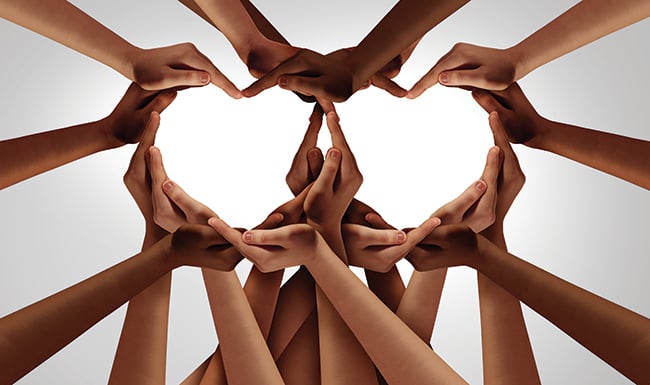 Source: Adobe Stock
Source: Adobe Stock
Last month, ReputationUs connected with six credit union executives from across the country and asked them five questions regarding social justice, DEI and other community plights and how taking a stance may affect their credit union's reputation. Their responses were genuine, insightful and encouraging.
Editor's note: Below you'll find responses from three of the executives who were interviewed. Last week, CU Times ran responses from the three other executives in part one of this two-part article series.
Recommended For You
Five for Six: Five Questions for Six Credit Union Executives
What social justice or related causes has your credit union taken on during the past year? Why and how?
 Kevin Martin
Kevin Martin Kevin Martin, SVP, SchoolsFirst Federal Credit Union ($25.2 billion, Santa Ana, Calif.): We believe our country is strongest when every American has the ability to fully participate, bringing and contributing all their talents and skills. We fully participate in our economy, our education system, our workforce and our society. Any force that impedes that full participation weakens our country. This is why we took a clear stance against racism. We are a member-owned financial cooperative. Our 1.1 million members span many forms of diversity (visible and not visible), including race and ethnicity. It is our mission, and honor, to serve every member and help them fulfill their financial goals. Every member.
Eric Petracca, CEO, iQ Credit Union ($1.6 billion, Vancouver, Wash.): Our primary focus has been on supporting our unique staff and members throughout this past year. We have dedicated a lot of time to educating ourselves so we can better celebrate and respect our differences as we continue to serve a more diverse membership.
 Stefanie Rupert
Stefanie Rupert Stefanie Rupert, President/CEO & DEI Officer, Collins Community Credit Union ($1.38 billion, Cedar Rapids, Iowa): Our employees have a voice and decision-making mechanism for the causes our credit union supports. We launched "Causal for a Cause" eight years ago to provide education, funding pathways and volunteerism with identified non-profit organizations. Some of the non-profits selected include:
- OneIowa: An organization that protects, advances and empowers the LGBTQ community.
- American Museum: A group dedicated to preserving history and culture.
- Women Lead Change: An Iowa-based group that supports the development, advancement and promotion of women and the organizations that hire them.
- Iowa's first Sister Society of the Global Women's Leadership Network: Collins Community Credit Union created and developed a branch of GWLN, bringing it home to Iowa and our mission.
By taking a stance on social justice issues, explain how this may affect your credit union's reputation.
Martin: The credit union movement is built on the concept of "people helping people." We believe treating every member with respect, care and empathy is our responsibility. We believe this is why people choose to join the credit union. Therefore, we believe and hope our commitment to serving every member is seen as aligned with our mission and purpose, therefore strengthening our reputation.
 Eric Petracca
Eric Petracca Petracca: Taking a stand on any issue can be risky. When we speak out supporting our Black staff and partners, our LGBTQIA+ members or our Asian American communities, we are saying that we see and hear them and that they are welcome at iQ Credit Union. There are others who think that is too political or not our lane, but we think that being inclusive is right for our members and our business.
Rupert: We are committed to taking a stance on social issues for the sake of our most significant asset, our entire team of 350 valued individuals. As a person of integrity, I am committed to social issues and strongly feel having your voice heard is essential. We take the historical and systemic racial issue very seriously, but we find it a complex topic like most. I struggle knowing that some of my employees may be suffering in silence over a lack of action taken at times to make this a better world.
To quote the author of "The Conversation," Dr. Robert Livingston, "It's not blind optimism. Here is a little-known truth: Racial equity is an achievable goal. That is not just my opinion – logic, data and scientific evidence all speak to the solvability of racism. In addition to being achievable, racial equity is desirable."
What role does diversity and equity have at your credit union?
Martin: California is the most diverse state in the union. Our members and our team reflect this diversity. We believe there is strength in this diversity. We believe our diversity allows us to better understand our members. We believe our diversity will improve the products, services and experiences we offer our members. Our DEI Promise captures the connection we see between diversity, equity and inclusion, and our ability to serve every member.
Petracca: Our role is to help our communities gain financial well-being. We are focused on helping individuals and groups succeed financially and we're out there listening to see if there are additional ways we can better serve specific communities. The more we learn about each other, the better we are at treating everyone with respect and appreciation for who they are and their unique circumstances. It helps us understand what they need and how we can help them with those needs.
For example, we added pronouns and education on why pronouns are important to our email signatures. We provided education on the topic to our leadership team that leads to small, inclusive changes like directing members to the "public restrooms around the corner" rather than using gender-specific language.
Rupert: As CEO, I have also been the DEI officer for eight years. I needed to lead this stance to show that it would become an essential part of the Collins culture. It starts at the top. We formed a Charter Committee and are now branching off into a council of paid employee resource ambassadors. Their job is to educate and promote information and community activities that advance their resource group's voice, strategic direction and organizational diversity on all levels. Our board of directors is incredibly supportive and encouraging of this strategic alignment with our vision statement of "igniting financial futures."
How has your credit union's initiatives with DEI changed, if any, in the past year due to the increased public focus on DEI?
Martin: We started our DEI journey in 2018. However, the summer of 2020 really increased the attention and expectations of DEI in our society and in the workplace. We are thankful that we were already having discussions on DEI, because it enabled us to build on an already established foundation and be nimbler than if we were starting from zero. In addition to our public statements on DEI in the wake of George Floyd's murder, we turned inward to ensure our team had a safe space to be heard, to listen, and to learn from each other and invited guests. Throughout our organization, discussions on inclusion and the acts of violence against fellow American citizens are a common occurrence. Although they're optional, we continue to see a high level of interest, and in many cases, this is the only safe space for our team to productively share their thoughts and concerns and be greeted with empathy.
Petracca: It has increased our focus on education and awareness at all levels of the credit union. We are seeking out more voices to help guide our decisions. Internally, we have formed an Inclusion & Belonging Task Force to help us navigate this journey and strengthen connections with each other and our members, while fostering an inclusive culture that celebrates inclusion and belonging at work and in our communities. Externally, while we have always supported a broad range of community organizations and activities, we are even more careful now to seek out organizations that may be looking for financial education or resources to help the communities they serve and not just support those who seek us out.
Rupert: We have a rich history of DEI work. This year in so many ways has taken a toll on women in the workforce, disenfranchising minorities even further with the injustice and senseless murder of George Floyd. We continuously strive to improve upon our accomplishments – collaboration, networking, reading and partnering with others further this work. As recently as last week in a DEI Cohort Meeting made of area leaders, I walked away with some new methods to strengthen the focus and importance of this social issue. For example, we plan to pay our resource group leaders, require an application and interview process, and added more metrics and visibility of success to this necessary effort. Providing the time to pursue topics is another way we embrace this change. We measure and report our statistics against our past and census data in the communities we serve.
Please provide any other insights about your credit union's activity for social justice and how it may affect your staff, recruiting, members and the communities your credit union serves.
Martin: When someone is worried about their safety, or the safety of a loved one, then they cannot give 110% to their job. When someone feels they have to hide certain parts of their identity to fit in, it takes a lot of energy, and that is energy they could be using to provide world-class service to our members.
Investments in DEI are smart for our culture, society and business. We cannot control our employees' experience outside our culture, but we want every employee to know that they are welcome in our credit union. We demonstrate that their well-being matters to us, and that their professional and personal insights are needed for us to fulfill our mission and serve every member. We hope the respect, care and empathy shown internally toward each other carries through in the way we engage our members. We need 110% from everyone. We believe DEI enables every employee to give 110%.
As the country becomes increasingly more diverse, we believe creating a more inclusive credit union movement is critical to the future of the movement. Therefore, we also invest in and collaborate with system partners to ensure the movement continues on its DEI journey. Key partners on this journey include the African American Credit Union Coalition and Filene's Center for Diversity, Equity and Inclusion.
Petracca: We are committed to creating a culture of inclusion and belonging that support our staff and members. The more people feel respected for who they are, the more likely they are to want to work for us, bank with us and be a part of what is happening at iQ.
Rupert: Several years ago, we added two required learning tracks at our all-day training employee meetings, one of which involved DEI. We have conducted unconscious bias training, purchased books and showed videos on these topics. Over the years, we increased our sponsorships to those organizations that are supporting DEI. Some of the projects we have undertaken include:
- Creating T-shirts to sell at an LGBTQ+ parade;
- Launching a project to allow for transgender preferred names on debit and credit cards;
- Implementing an all-Spanish website;
- Revisiting our acceptable forms of identification to make getting loans easier for all with ITIN lending; and
- Placing a gender-inclusive public bathroom in our new headquarters.
In the end, our team feels valued when we shine a light on them. When we provide opportunities for all employees to thrive, we all benefit. This work comes from the heart and is automatic for us on the recruitment front. On the horizon, we will be rolling out a youth literacy hub called YB: "You Belong," which will be nestled in lower-income areas and focus on a food bank and other beneficial services.
Take Action … Now
In 2021 and the years to come, there have been and will continue to be several opportunities for credit unions to show up, speak out and take a stance against injustice (e.g., BLM, Stop Asian Hate, DEI). Staff, members and the community are secretly paying attention. Now is the time to enhance and advance your credit union's reputation by taking a stance, communicating your disdain and offering help to be a part of the solution.
- If your credit union is appalled … do something.
- If your credit union stands against injustice (as we hope it does!) … take action.
- If your credit union has meaningful solutions … offer them now!
 Casey Boggs
Casey Boggs Casey Boggs is President of ReputationUS in Portland, Ore.
© 2025 ALM Global, LLC, All Rights Reserved. Request academic re-use from www.copyright.com. All other uses, submit a request to [email protected]. For more information visit Asset & Logo Licensing.







